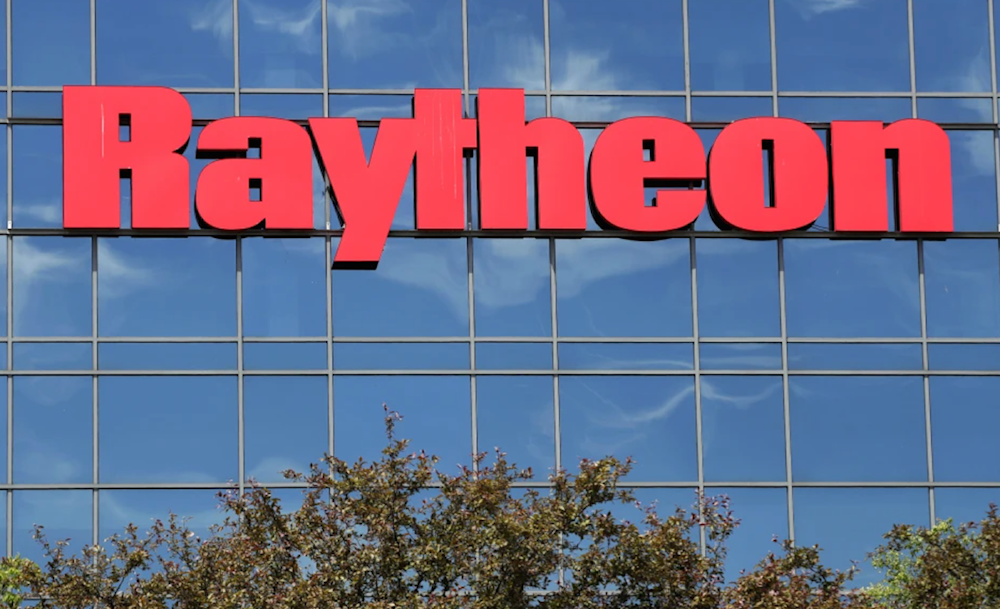US Raytheon fined near $1 bln for bribery, inflated contracts
Raytheon has agreed to pay the fines and has not denied the claims of fraudulent behavior.
-

The facade of Raytheon's Integrated Defense Systems facility on June 10, 2019 in Woburn Massachussets. (AP)
US weapons manufacturer Raytheon has been ordered by the US government to pay over $950 million in fines for inflating federal contracts and bribing high-level foreign military officials, according to an announcement on Wednesday.
A statement by the US Justice Department indicated that Raytheon, a subsidiary of RTX, has not denied the claims and agreed to pay the fines.
The firm will enter into a three-year deferred prosecution agreement (DPA) to resolve the accusations, which include two counts of "major fraud against the United States."
"Raytheon admitted to engaging in two separate schemes to defraud the Department of Defense (DOD) in connection with the provision of defense articles and services, including PATRIOT missile systems and a radar system," the Justice Department's press release said.
Raytheon inflated contracts for more than a decade
Prosecutors allege that between 2012 and 2013, and again from 2017 to 2018, Raytheon employees submitted "false and fraudulent information" to the Defense Department during contract negotiations for the sale of Patriot missile systems and the operation and maintenance of a radar system.
In both instances, they claim the Defense Department was misled, resulting in Raytheon receiving $111 million more than warranted. Additionally, Raytheon has admitted to consistently providing inaccurate information regarding the costs and pricing of various federal contracts from 2009 to 2020.
Furthermore, the manufacturer has agreed to a separate three-year DPA on two additional charges, including a conspiracy to bribe a high-level Qatari military official and a conspiracy to violate the Arms Export Control Act (AECA) in order to conceal bribes in export licensing applications with the State Department.
Raytheon is also alleged to have achieved a second False Claims Act settlement with the Justice Department over the flawed pricing techniques.
According to Deputy Assistant Attorney General Kevin Driscoll of the Justice Department's Criminal Division, "Raytheon engaged in criminal schemes to defraud the US government in connection with contracts for critical military systems and to win business through bribery in Qatar."
Driscoll emphasized, “Such corrupt and fraudulent conduct, especially by a publicly traded U.S. defense contractor, erodes public trust and harms the DOD, businesses that play by the rules, and American taxpayers."
The two DPA agreements compel Raytheon to maintain an independent compliance monitor for three years, improve its internal compliance program, report evidence of additional misbehavior, and assist in any existing or future criminal investigations, according to the Justice Department.
US Raytheon making billions in blood money from Ukraine arms sales
Raytheon, the world's largest producer of guided missiles, has seen significant profits from military supplies to Ukraine since the war began in February 2022, reversing its previous sales struggles.
Raytheon Missiles & Defense (RMD), a subsidiary of RTX Corporation focused on missile production, has delivered National Advanced Surface-to-Air Missile Systems (NASAMS) directly to Ukraine.
Since the fourth quarter of 2022, Raytheon has reported five consecutive quarters of revenue growth after facing declines prior. The company’s backlog of signed but unfulfilled defense contracts has increased from $63 billion at the end of 2021 to $77 billion by the end of the second quarter of this year, demonstrating its ability to capitalize on the heightened demand driven by ongoing US military support for Ukraine.
Raytheon has had five consecutive quarters of revenue increase since the fourth quarter of 2022, after dealing with sales declines for four quarters prior, according to the company's most recent financial report.
RMD experienced a downturn in new orders starting in the fourth quarter of 2021, with an 8% year-on-year reduction. By the second quarter of 2022, RMD faced its third consecutive revenue decline, down 11% compared to the previous year. However, this quarter marked a shift as new orders began to reflect increased demand due to the escalating conflict in Ukraine, with $3.56 billion in new sales, including $662 million from Stinger missile replenishments for the US Army.
By the fourth quarter of 2022, RMD reported a 6% year-on-year sales growth, driven by the demand for missiles linked to Ukraine. A significant $698 million contract for the National Advanced Surface-to-Air Missile System (NASAMS) accounted for 17% of its $4.1 billion in new sales for that quarter. As the US continued to supply missiles to Ukraine, RMD saw a steady stream of new orders in the following months.

 4 Min Read
4 Min Read








